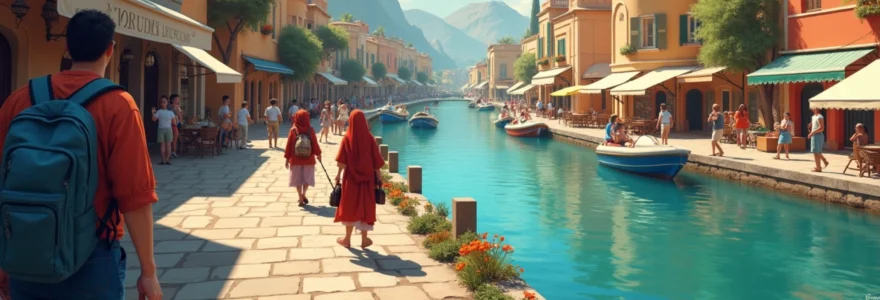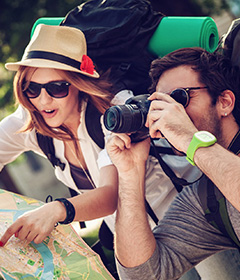Educational travel offers a unique opportunity to combine the excitement of exploring new destinations with the enrichment of learning experiences. This innovative approach to education goes beyond traditional classroom settings, immersing learners in real-world environments that stimulate curiosity, foster cultural understanding, and promote lifelong learning. By engaging with diverse cultures, historical sites, and natural wonders, travellers gain invaluable insights that textbooks alone cannot provide.
The concept of educational travel has gained significant traction in recent years, with educators and learners alike recognising its potential to transform the way we acquire knowledge and skills. This approach not only enhances academic understanding but also develops crucial soft skills such as adaptability, cultural sensitivity, and critical thinking. As the world becomes increasingly interconnected, the ability to learn while travelling has become an essential tool for personal and professional growth.
Pedagogical foundations of educational travel
The pedagogical foundations of educational travel are rooted in experiential learning theories, which emphasise the importance of direct experience and reflection in the learning process. This approach aligns with the principles of constructivism, suggesting that learners actively construct knowledge through their interactions with the environment and others. By engaging with real-world contexts, travellers can develop a deeper understanding of complex concepts and their practical applications.
Educational travel also draws upon the principles of situated learning, which posits that learning is inherently tied to authentic activities, contexts, and cultures. This approach recognises that knowledge is not merely transmitted but co-constructed through participation in social practices. By immersing themselves in diverse cultural settings, learners can develop a more nuanced understanding of global issues and perspectives.
Moreover, educational travel incorporates elements of transformative learning theory, which emphasises the power of disorienting experiences to challenge existing assumptions and promote personal growth. Encountering unfamiliar situations and perspectives can prompt critical reflection and lead to significant shifts in worldview and self-perception.
Educational travel is not just about seeing new places; it’s about experiencing them in ways that challenge our assumptions and expand our understanding of the world and ourselves.
The pedagogical value of educational travel extends beyond academic knowledge acquisition. It also fosters the development of 21st-century skills such as cross-cultural communication, problem-solving, and digital literacy. These competencies are increasingly vital in a globalised world and can significantly enhance learners’ future prospects in education and employment.
Immersive language acquisition through cultural exchange
One of the most effective applications of educational travel is in the realm of language acquisition. Immersive language learning experiences provide unparalleled opportunities for rapid progress and deep cultural understanding. By engaging with native speakers in authentic contexts, learners can develop linguistic skills far more quickly and effectively than in traditional classroom settings.
Total immersion techniques in language villages
Language villages offer a unique environment for total immersion in a target language and culture. These purpose-built communities simulate the experience of living in a foreign country, complete with authentic cuisine, cultural activities, and daily routines conducted entirely in the target language. Participants are encouraged to use the language in all aspects of daily life, from ordering meals to participating in recreational activities.
The effectiveness of language villages lies in their ability to create a low-stress environment where learners feel comfortable taking risks and making mistakes. This approach aligns with Stephen Krashen’s affective filter hypothesis , which suggests that a relaxed and positive atmosphere is conducive to language acquisition.
Tandem learning partnerships with local students
Tandem learning partnerships pair language learners with local students for mutual language exchange. This reciprocal arrangement allows both parties to practice their target language while helping their partner with their native language. These partnerships often extend beyond language practice to include cultural exchange, fostering deeper understanding and lasting friendships.
The benefits of tandem learning are twofold: learners gain access to authentic language use and cultural insights, while also developing valuable intercultural communication skills. This approach exemplifies the principle of reciprocal learning, where both parties benefit from the exchange of knowledge and experiences.
Linguistic landscapes: decoding urban signage
Exploring linguistic landscapes involves studying the language used in public spaces, such as street signs, advertisements, and graffiti. This approach provides valuable insights into the sociolinguistic realities of a community, including language policies, multilingualism, and cultural attitudes towards different languages.
By engaging with linguistic landscapes, learners can develop their ability to decode contextual clues and understand language use in real-world settings. This practice enhances both linguistic competence and cultural awareness, as learners navigate the complex interplay between language and society.
Digital language tools for real-time translation
Advancements in technology have revolutionised language learning during travel. Real-time translation apps and devices enable learners to bridge communication gaps quickly, facilitating more meaningful interactions with locals. While these tools should not replace language learning efforts, they can serve as valuable aids in navigating unfamiliar linguistic terrain.
The integration of digital tools in language learning aligns with the concept of ubiquitous learning , which emphasises the importance of accessing educational resources anytime and anywhere. By leveraging technology, learners can enhance their language acquisition process and gain confidence in real-world communication scenarios.
Historical and archaeological expeditions as living classrooms
Historical and archaeological expeditions transform ancient sites and artefacts into dynamic learning environments. These experiences allow travellers to engage directly with the material evidence of past civilisations, fostering a deeper understanding of historical events and cultural developments.
Hands-on excavation experiences at active dig sites
Participating in archaeological excavations provides unparalleled opportunities for hands-on learning about ancient cultures and archaeological methods. Learners can engage in activities such as surveying, excavating, and cataloguing artefacts under the guidance of professional archaeologists. This immersive experience not only teaches practical skills but also instils a sense of stewardship for cultural heritage.
The value of these experiences lies in their ability to bring history to life, allowing participants to literally uncover the past with their own hands. This tactile engagement with historical evidence can spark a lifelong passion for archaeology and historical preservation.
Augmented reality tours of ancient civilisations
Augmented reality (AR) technology has revolutionised the way we experience historical sites. AR tours overlay digital reconstructions onto real-world environments, allowing visitors to visualise ancient structures and landscapes as they once appeared. This technology bridges the gap between past and present, providing a more immersive and engaging learning experience.
By combining visual stimuli with historical information, AR tours cater to diverse learning styles and enhance information retention. This innovative approach to historical education aligns with the principles of multimodal learning , which recognises the benefits of engaging multiple senses in the learning process.
Primary source analysis in historical archives
Visiting historical archives and engaging with primary sources offers a unique perspective on historical events and figures. Learners can examine original documents, letters, and artefacts, developing critical analysis skills and gaining insights into the complexities of historical interpretation.
This approach to historical study emphasises the importance of source evaluation and contextualisation, skills that are crucial for developing historical thinking. By working with primary sources, learners can better understand the process of historical inquiry and the challenges of reconstructing past events.
Reenactment workshops for Period-Specific skills
Historical reenactment workshops provide immersive experiences that allow participants to learn and practice skills from specific historical periods. These workshops might focus on activities such as medieval craftsmanship, Renaissance cooking, or 19th-century farming techniques. By engaging in these hands-on activities, learners gain a more visceral understanding of daily life in different historical contexts.
The value of reenactment workshops lies in their ability to bring history to life through experiential learning. This approach not only enhances historical understanding but also promotes appreciation for traditional skills and craftsmanship.
Environmental studies through Eco-Tourism
Eco-tourism offers a unique platform for environmental education, allowing travellers to engage directly with diverse ecosystems and conservation efforts. This form of educational travel not only enhances understanding of environmental issues but also promotes sustainable tourism practices and conservation awareness.
Biodiversity surveys in tropical rainforests
Participating in biodiversity surveys in tropical rainforests provides hands-on experience in ecological research methods. Travellers can learn to identify flora and fauna, collect data on species distribution, and contribute to ongoing conservation projects. These experiences offer valuable insights into the complexity and fragility of rainforest ecosystems.
The immersive nature of these surveys allows participants to develop a deep appreciation for biodiversity and the challenges of conservation. This firsthand experience can inspire a lifelong commitment to environmental stewardship and sustainable practices.
Marine conservation projects in coral reef ecosystems
Marine conservation projects offer opportunities to study and protect coral reef ecosystems. Participants can engage in activities such as coral restoration, marine species monitoring, and ocean plastic removal. These experiences provide valuable lessons in marine biology, ecosystem management, and the impacts of climate change on oceanic environments.
By actively contributing to conservation efforts, travellers gain a sense of agency in addressing global environmental challenges. This hands-on approach to learning aligns with the principles of action research, emphasising the importance of practical engagement in understanding and addressing complex issues.
Climate change impact assessment in polar regions
Expeditions to polar regions offer unique opportunities to witness and study the impacts of climate change firsthand. Travellers can participate in activities such as glacier monitoring, wildlife surveys, and permafrost studies. These experiences provide tangible evidence of global warming and its effects on sensitive ecosystems.
The stark realities of climate change in polar regions can serve as powerful catalysts for environmental awareness and action. This form of educational travel exemplifies the concept of transformative learning , where direct experiences lead to significant shifts in perspective and behaviour.
Sustainable agriculture practices in indigenous communities
Learning about sustainable agriculture practices in indigenous communities offers insights into traditional ecological knowledge and sustainable resource management. Travellers can participate in activities such as organic farming, agroforestry, and traditional food preparation. These experiences highlight the importance of cultural diversity in addressing global environmental challenges.
By engaging with indigenous communities, learners can gain a more holistic understanding of sustainability that incorporates cultural, social, and ecological dimensions. This approach aligns with the principles of biocultural diversity , recognising the interconnectedness of biological and cultural diversity.
STEM education in global innovation hubs
Educational travel to global innovation hubs provides unparalleled opportunities for STEM (Science, Technology, Engineering, and Mathematics) education. These destinations offer access to cutting-edge research facilities, innovative companies, and world-class universities, allowing learners to engage with the latest advancements in science and technology.
Visiting innovation hubs such as Silicon Valley, Tokyo, or Berlin exposes travellers to the dynamic ecosystems that drive technological progress. Participants can attend workshops on emerging technologies, visit state-of-the-art laboratories, and engage with industry leaders. These experiences provide valuable insights into the practical applications of STEM fields and inspire future career paths.
Moreover, educational travel to innovation hubs fosters an entrepreneurial mindset by exposing learners to startup cultures and innovation processes. This exposure can spark creativity and encourage problem-solving skills that are essential in the rapidly evolving STEM fields. The immersive nature of these experiences allows participants to develop a deeper understanding of the global context of scientific and technological advancements.
Engaging with global innovation hubs through educational travel can ignite a passion for STEM fields and provide a broader perspective on the role of technology in addressing global challenges.
Additionally, these experiences often incorporate elements of design thinking and project-based learning , allowing participants to apply their knowledge to real-world problems. This practical approach enhances the relevance of STEM education and promotes the development of critical 21st-century skills such as collaboration, creativity, and adaptability.
Cross-cultural competence development via homestay programmes
Homestay programmes offer one of the most effective ways to develop cross-cultural competence through educational travel. By living with local families, travellers immerse themselves in daily life, customs, and social norms of the host culture. This intimate experience fosters deep cultural understanding and personal growth.
Ethnographic fieldwork techniques for cultural immersion
Incorporating ethnographic fieldwork techniques into homestay experiences enhances cultural learning. Participants can learn to conduct participant observation, informal interviews, and keep detailed field notes. These skills not only enrich the travel experience but also develop valuable research competencies applicable in various academic and professional contexts.
The practice of ethnographic fieldwork during homestays encourages travellers to move beyond surface-level observations and engage more deeply with cultural phenomena. This approach aligns with the principles of thick description in anthropology, emphasising the importance of context and interpretation in understanding cultural practices.
Intercultural communication workshops with local experts
Intercultural communication workshops led by local experts provide structured opportunities to develop cross-cultural skills. These sessions can cover topics such as non-verbal communication, cultural values, and strategies for navigating cultural differences. By engaging with local experts, participants gain insider perspectives on cultural nuances and practical tips for effective cross-cultural interaction.
These workshops often incorporate role-playing exercises and case studies, allowing participants to practice intercultural communication skills in a supportive environment. This experiential approach enhances cultural sensitivity and prepares travellers for more meaningful interactions during their homestay experiences.
Collaborative arts projects for non-verbal expression
Engaging in collaborative arts projects with host community members offers unique opportunities for non-verbal expression and cultural exchange. Activities such as mural painting, traditional craft workshops, or music and dance collaborations allow participants to connect across language barriers and express shared human experiences.
These artistic collaborations exemplify the power of creative expression in fostering intercultural understanding. By working together on creative projects, participants can develop mutual respect and appreciation for diverse cultural perspectives.
Conflict resolution strategies in multicultural settings
Learning and applying conflict resolution strategies in multicultural settings is an essential component of developing cross-cultural competence. Workshops on intercultural conflict resolution can provide valuable tools for navigating misunderstandings and differences that may arise during homestay experiences.
These sessions often focus on skills such as active listening, perspective-taking, and finding common ground. By developing these competencies, participants enhance their ability to build positive relationships across cultural boundaries and resolve conflicts constructively.
The development of cross-cultural competence through homestay programmes and associated activities is a transformative process that extends far beyond the duration of the travel experience. These skills are increasingly valuable in a globalised world, enhancing personal growth, academic pursuits, and professional opportunities.


